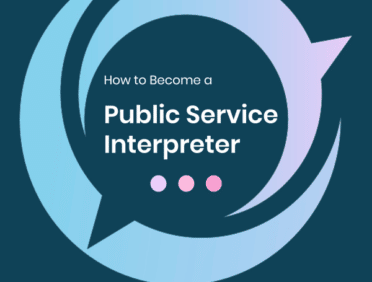Importance of Interpreting in the UK National Health Service (NHS)
Here in the UK we now have a variety of different cultures and nationalities living, working and raising their families. All in one space. Whilst there are lots of amazing things that can come from a multicultural way of life, it has to be said that there can also be some challenges faced by those who choose to live in the UK.
The main one has to be the barriers that are created by not speaking English as a first language. This is particularly true when it comes to accessing key services that those people are going to need. Such as within the NHS.
This is where the idea of interpreting can help. Interpreters can act as a go-between during conversations that service users are going to have with service providers within the NHS. Interpreters can help both parties to be understood, for the service user (e.g. a patient) to know what is going to happen to them and what their diagnosis is, as well as for the service provider (e.g. medical professional) to properly understand what is happening with the service user and give them the right and accurate diagnosis.
The Role of Community Interpreting in Healthcare
For those people who need to access interpreting within healthcare, community interpreters are available. But, what are they and what can they help with?
Definition and Responsibilities of Community Interpreters
The main role of a community interpreter is someone who can speak English (the ‘source’ language) and the other (‘target’) language and ensure that the service provider can communicate effectively with the service user. They will interpret, there and then, the information that the service provider needs to know to make a diagnosis. Then they will interpret and relay this diagnosis (and the treatment plans for the future) to the service user.
This is, in most cases, a paid position, or it may be a voluntary position. However, interpreters providing a service within the NHS should always be suitably qualified with a Level 3 Certificate in Community Interpreting or higher.
Key Challenges in Healthcare Communication for Limited English-Proficient service users
One of the main challenges that come when a service user is LEP (Limited English-Proficient) is the fact that they may not get an accurate, or timely diagnosis for whatever medical condition, issue or emergency they are faced with.
The service user may not be able to communicate with the service provider what their symptoms are and the severity of those symptoms. They may also find it hard to understand when the service provider is asking them questions to obtain further information. This will all provide barriers to effective diagnosis.
This situation can be made even worse when the person who needs the medical help is feeling frustrated about the care that they need or they are frightened about what may happen to them.
Misdiagnosis may end up causing the issue to be even worse, or for the service user to have further complications in the future.
How Community Interpreters Address Language Barriers in the NHS
One of the main ways that community interpreters help is to address the language barriers that LEP service users face. They can ensure that the symptoms have been properly communicated to the service provider and that any relevant medical information or questions are then communicated back the other way.
A community interpreter will have excellent language skills, good knowledge in the subject matter and be fully aware of, and able to put into practice, interpreting skills and the interpreter code of conduct meaning the provision that a community interpreter provides is accurate and risk free. Whatever their situation, being able to help those who are LEP service users means that interpreters can ensure that these people can access the medical care that they need, and then get the right treatment plans for them. Without an interpreter, this wouldn’t be possible and the service user would not be able to get help.
The Evolution of NHS Language Access Policies
Whilst the need for interpreting and language assistance within the NHS has always been there, however, there have been some huge changes over recent years. This has meant that there have been changes to the policies that cover language access within the NHS.
Historical Background of Interpreting Services in the NHS
Language interpreting hasn’t always been offered within the NHS. This may have been because it wasn’t seen as something that was “needed” before more and more people decided to move to the UK, but of course, it has always been something that could prove to be useful to those who require the service. It may also have been because there may not have been a commitment from the NHS to ensure every potential service user could get equal access to the services provided by the NHS.
Because there wasn’t a commitment from the NHS to provide an interpreter, more often than not a family member would act as an interpreter for the service user. This presented a number of risks to the service user as a friend or family member would be unlikely to know how to provide a professional service, nor have any subject matter expertise, so often it resulted in inaccurate interpreting and therefore incorrect information or advice being given. In some cases it may even have been a child if that was the only person available. Imagine if the service provider had bad news for the service user, up to and including end of life. As you can imagine, this is not appropriate information for a child to be interpreting.
Previous Policies and Their Impact on Language Access
Language access within the NHS changed with The Equality Act of 2010. This Act covered a wide range of equality issues within our modern society, one of which was access to interpreting services within the NHS (and other public services).
This Act changed the policies (and even created additional policies) to ensure that language access was something that was prioritised within the NHS.
The Need for a Comprehensive Policy on Community Interpreting
It is important that interpreting within the NHS is covered by a comprehensive policy. This is to stop any issues from arising when it comes to interpreting any of the medical information between the service user and the service provider. It ensures that every community interpreter understands their role and what is expected of them.
This also demonstrates that the NHS is taking the need of LEP service users seriously and that it wants to make changes to ensure that everyone in the UK, no matter where they are from or what language they speak; can gain access to the medical help that they need.
Understanding the Current NHS Policy on Interpreting
We have already explored how high-quality interpreting can benefit those who are recognised as being LEP service users in ensuring that they receive the best quality healthcare possible, and the same quality of service that anyone else could access. But where do the NHS stand when it comes to providing or giving access to community interpreters within their healthcare setting?
The Official NHS Interpreting Policy
As mentioned, the current NHS policies on access across languages aim to ensure equitable healthcare access for all, regardless of language barriers. They emphasise the importance of providing interpreting (and translation) services to LEP speakers to facilitate effective communication between service providers and service users. This includes offering interpreters, especially for critical medical information.
These policies also encourage healthcare professionals to be culturally sensitive and responsive to the diverse linguistic needs of patients. It’s essential to maintain clear and open channels of communication to guarantee that individuals with limited English proficiency can fully comprehend their diagnoses, treatment options, and healthcare rights.
To promote awareness and compliance with these policies, the NHS employs various outreach and education programs, as well as partnerships with community organisations to bridge language gaps and ensure that language is not a barrier to accessing healthcare services.
Currently, the NHS has a responsibility to make sure that any services they provide can be accessed by anyone who needs them. This is regardless of who they are and what additional needs they have.
Policy Implementation in Different Healthcare Settings
One thing that is important to know about policies, is that they relate to all of the settings within the NHS. Therefore, LEP service users should find that the level of support that they are given is the same no matter where they are or what support they need.
This makes it even more important that community interpreters are available for all who require them, no matter where they are or the language that they speak.
NHS Guidelines for Engaging Community Interpreters
To bring in community interpreters to the NHS, the NHS needs to be able to engage with them as well as they possibly can. This means that the NHS needs to recognise the importance of interpreters and the help/support that they bring to service users.
All interpreters should be treated with respect and in a professional way that recognises the vital importance of their skills and what they can provide to the service users who need it most.
Community Interpreter Training and Qualifications
Whilst the key aspect of becoming a community interpreter is being able to speak the required languages fluently (as a guideline for the Level 3 Certificate in Community Interpreting, they would need to have B2 as a minimum level of competence against the Common European Framework for Languages) there are also some other skills that interpreters need to enable them to provide a professional service to service users within the NHS.
Requirements for Becoming a Certified Community Interpreter
If you want to become a qualified paid interpreter then you need to be working towards your Level 3 Certificate in Community Interpreting. The Level 3 offered by Learn Q is an entry level course, meaning you do not need to have studied Levels 1 or 2 to make a start. Level 3 is the first level that allows those who hold the certificate to offer professional, paid, interpreting services.
The Level 3 Certificate in Community Interpreting allows you to accept paid interpreting assignments in community settings including:
• Health
• Mental Health
• Job centres / welfare
• Social services
• Housing
• Education
• Immigration
• Local government
Any legal work (e.g. courts, police) usually require a higher level of qualification (Level 6) and at least 2 year’s professional experience.
The Role of Training Programmes in Enhancing Language Services
It is vitally important to ensure that someone is bilingual if they are going to be working as an interpreter, but, to provide a high-quality service to those who need interpreting, community interpreters must enhance their language skills, particularly when it comes to vocabulary and terminology, and a thorough understanding of interpreting techniques and the interpreter code of conduct.
This is where training programmes can help. Training programmes such as Learn Q’s Level 3 Certificate in Community Interpreting go much further than addressing langauge, ensuring that the interpreters have a range of skills that allows them to communicate effectively with the service users and the service providers within the NHS, and provide a professional and risk free interpreting service.
Ensuring Cultural Competence and Sensitivity in Community Interpreters
Another aspect that is covered within these training programmes is cultural competence and sensitivity. This helps interpreters to understand different approaches and guidelines between cultures, meaning interpreters show sensitivity and ensure that the person who is an LEP service user feels that their beliefs and values are being recognised and respected as much as they can within the setting, but also that the services (such as medical care) is being provided at a consistent level to any other service user.
This is, much of the time, just as important as being able to interpret medical needs and relay this to the service provider.
Benefits and Challenges of the NHS Interpreting Policy
There are plenty of positives that comes with ensuring that the NHS provides an effective and comprehensive interpreting service to its service users. That said, some key challenges can come with it too. However, these are often straightforward to overcome.
Improved service user Outcomes and Satisfaction
The most important positive impact of providing interpretingservices to NHS users is that it allows them to have the best possible outcome for their health concerns. They will be able to access medical care as early as possible, which, if provided with the right treatment plan, should give them the best chance of recovery.
They can also highlight any concerns that they may have to the service provider, things that they may not know how to do outside of their language, which can ensure that they have the best care possible.
Cost-effectiveness and Efficiency in Healthcare Delivery
Interpreting services can also help to ensure that the healthcare solutions that are delivered are efficient and cost-effective. The health concerns that the service users have can be understood properly and treated quickly, which means that the service user spends the least amount of time necessary in the hospital or healthcare setting.
This reduces the workload for service providers and also ensures that there is less chance of a backlog building up. Both of these provide benefits to the NHS and other service users and can have an impact on the much wider service provision.
Addressing Potential Challenges and Limitations
Some challenges can come up with providing an interpreting service to healthcare users. One of the main ones is that the languages that are needed can be diverse (over 250 languages are currently spoken in the UK), and it can be hard to ensure that there are always enough qualified interpreters available with the right language combination.
At the moment the NHS still uses a number of unqualified interpreters, which can pose significant risks to service users. In one recent case, a mother died during because she did not understand the instructions provided by the healthcare professionals. Professional interpreting from a qualified interpreter could have easily saved this mother’s life.
Enhancing Language Access in the NHS: Best Practises
As more and more people are likely to require an interpreting service within the NHS, more and more has been discovered about how to offer this service to the highest standard possible. With this, best practices have been learnt which help to streamline the service as much as possible, giving the best outcome for all concerned.
Collaboration with Language Service Providers
The first best practice that has been learnt is the importance of ensuring that the NHS collaborates with the Language Service Providers (LSP) who supply interpreting services. They need to develop a sense of partnership, with equal recognition of the importance of the part that they play in the process.
LSPs need to commit to only using interpreters with a Level 3 Certificate in Community Interpreting, as a minimum, for NHS work, and education should be provided on both sides to ensure service providers know how to work with interpreters efficiently to get the best results.
Leveraging Technology for Remote Interpreting Services
Whilst the ideal situation is face to face (in-person) interpreting, this is not always possible due to availability, accessibility and practicality. Therefore, remote interpreting services, including telephone and video remote interpreting are really helpful. These services are both provided in real time, and can be just as effective as the face to face option. In some cases remote interpreting services can be provided in less time, and at less expense, than in person. Plus, if an interpreter is not in the room with a sick service user, it is also less of a risk to the health of the interpreter and others who they come into contact with.
While telephone interpreting services have been used for many years, the availability, functionality and quality of video call software have seen a rise since the Covid 19 pandemic, which has led to a better and more wide-ranging service for those who need it.
Integrating Interpreting Services into Electronic Health Records
Whilst it is great to have to interpret when delivering news on or diagnosing health care issues, it can be applied much wider than this. Interpreting of different languages can be applied to electronic health records.
This means that should the service user wish to access their records, they will be able to understand exactly what has been written. This is important, particularly for those who are having a baby, or who have a diagnosed long-term condition which requires ongoing support.
Ensuring Compliance and Monitoring Progress
Much like many things in the world, there is a need to make sure that any interpreting services that are provided to service users are delivered to the highest standard possible. One of the best ways to ensure that this is happening is to have compliance and monitoring procedures and processes in place.
Evaluation and Auditing of Interpreting Services
Whilst you cannot always audit and evaluate the actual language services that are being provided to service users, what you can do is ensure that the interpreting services that are being delivered are to the highest standard possible.
One way to do this is ensure that all interpreters who are working with the NHS have the proper qualifications and have been tested in a practical setting.
There is also the need for a commitment from the interpreters themselves, who need to be treating service users in a way that is kind and considerate and ensure that they are sensitive to not only their cultural values and beliefs but also to them as a person and a service user too. If interpreters follow the interpreter code of conduct correctly, this will not be an issue.
It is simple enough to spot check any professional interpreter, and this already happens with Ministry of Justice (MoJ) interpreters, particularly when the service is being provided by phone or video software. This should be implemented within health settings also to audit the quality of the provision.
Addressing Feedback and Concerns from service users and Interpreters
From time to time, there can be issues and concerns that are raised throughout the interpreting process. This can be from the service user, or it could be from the interpreter. This feedback must be listened to and taken on board.
This can then help to ensure that any steps that need to be taken are completed and that the service is improved in the future.
This feedback can be something that NHS staff, or the LSP may not have thought of or come across before.
Continuous Improvement and Adaptation to Changing Needs
Things change around us all the time. It is important to make sure that we know how we can move and change with these things. In most cases, change is good and it should be seen as a way to improve and adapt.
This is true when it comes to community interpreting. By improving and adapting to the needs of the users of the service, those who provide interpreting, along with the medical staff, can make sure that the service users, those who the focus should be on, have their needs met.
Measuring Success and Areas for Further Improvement
As well as going by the feedback that service users and interpreters have on the provision of service, success should also be measured by the service providers. When time is taken to see what is working well, it can also highlight further areas for improvement.
When you know what needs to be improved, this can make the service even better and ensure that those who need the help can receive it easily.
Future Outlook and Recommendations
Whilst it is good to focus on the here and now, it is also important to have an eye on the future. Things change and if we can predict future changes, then it is possible to anticipate them and make provisions.
Potential Developments in NHS Interpreting Policy
It is likely that over the next few years that the language requirements will change as the demographics of the UK population changes. This can, of course, be difficult to anticipate as it sometimes depends on world events, but by looking at what is happening in the world now it is sometimes possible to predict what may be a requirement in the coming months and years and make arrangements. The average time that a Learn Q Level 3 Certificate in Community Interpreting student takes to qualify is just 3 months, so an increase in interpreters with a new language combination can be provided relatively quickly.
There is also likely to be a continuing increase in remote interpreting to deliver efficiencies so that is also something that can be adjusted to making sure NHS facilities have the right equipment and both interpreters and service providers know how to use this technology.
Expanding Language Access in Diverse Communities
We have already identified the great things about having such a diverse community here in the UK at present and in the future. Along with these positives, one of the issues that can arise is ensuring that the needs of these cultures are met.
We must expand language access in diverse communities as much as possible. We want to be able to make it as easy as possible for these people to access the medical support and healthcare that they are going to need to ensure that they stay healthy and have the same opportunities in life as anyone else.
This is particularly true for anyone who may be identified as being vulnerable, as they are the ones who may need to access interpreting the most and find it hardest to do so.
Advocating for Increased Support and Recognition of Community Interpreters
Whilst we may all know the importance of medical staff and what they can do for us all, it is easy to overlook just how important community interpreters are. These people allow everyone, no matter what language that they speak, to access the medical help that they need.
Without them, it would be almost impossible for all service users to get the diagnosis that they need and the medical treatment that they require. Inadequate provisions can delay diagnosis and treatment and result in longer recovery times.
Training and Professional Development for Community Interpreters
To be able to provide the best interpreting service, community interpreters must access the right training and professional development opportunities.
Available Training Programmes in the UK
The best place to start when it comes to learning to be a qualified interpreter is with the Level 3 Certificate in Community Interpreting. This teaches students everything they need to know about how to be an interpreter and is the entry level for getting paid interpreting work. The Learn Q provision is all studied online so you don’t need to leave your home or spend time travelling to and from a location. The exam is also online via Zoom. All you need is a good internet connection and an internet ready device (a laptop or PC is best).
Fortunately, it is becoming increasingly difficult for unqualified people to find work as interpreters so if you wish to work in this field you are recommended to study and gain a qualification as soon as possible.
Continuing Education and Skill Development
To be the best community interpreter possible, you must keep working on the skills that you learn as well as developing additional skills and vocabulary. Continual Professional Development (CPD) for interpreters can take many forms, and does not always cost any money. It can include:
- Workshops and Seminars: Attending workshops, seminars, and conferences is a common CPD method. These events provide opportunities to learn from experts, network with peers, and gain new insights.
- Online Courses: Enrolling in online courses, webinars, and e-learning platforms can be a convenient way to access educational resources from anywhere. Platforms like Coursera, LinkedIn Learning, and edX offer a wide range of courses.
- Reading and Research: Keeping up with industry-related books, journals, blogs (such as the ones available on Learn Q) and research papers is a self-directed CPD method. You can also participate in research projects or write articles to contribute to your field.
- Mentorship and Coaching: Having a mentor or coach can provide personalised guidance and support for your professional growth. They can help you set goals and navigate your career.
- Networking: Building a professional network through industry associations, LinkedIn, or local meetups can lead to valuable connections and learning opportunities.
- Reflective Practice: Regularly reflecting on your work, projects, and experiences can be a powerful form of CPD. Analysing what went well and what could be improved helps you grow.
- In-House Training: Many organisations offer in-house training programs and workshops for employees to enhance their skills and knowledge.
- Certifications and Qualifications: Pursuing relevant certifications and qualifications can validate your expertise and demonstrate your commitment to professional development.
- Volunteering: Getting involved in volunteer work related to your profession can be a rewarding CPD method. It allows you to apply your skills in different contexts and make a positive impact.
- Conferences and Webinars: Attending industry-specific conferences and webinars can provide access to the latest trends, technologies, and best practices in your field.
- Peer Learning: Collaborating with colleagues and peers on projects or brainstorming sessions can be a valuable CPD method, as it encourages the exchange of ideas and knowledge.
Once they have a few years’ experience of working as a professional, some interpreters move on to a Level 6 qualification (the Level 6 Diploma in Public Service Interpreting (DPSI) is the best recognised), which allows them to work in additional sectors – particularly in legal settings.
Learn Q Interpreter Training and Qualifications
If you would like to start a career in interpreting, Learn Q recommend the Level 3 Certificate in Community Interpreting. It teaches you everything you need to know about how to be an interpreter and is the entry level for getting paid interpreting work. If you choose one of our money saving bundles, it includes the course, exam and certificate.












